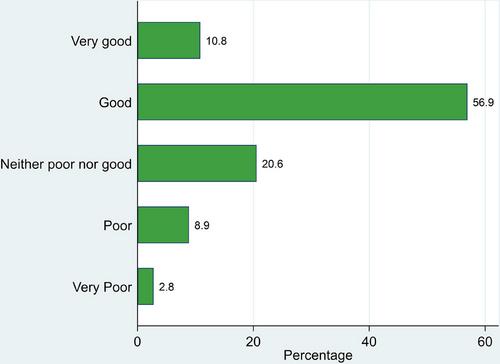Domain-Specific Diabetes Self-Management Correlates of Quality of Life Among Adults With Diabetes Mellitus in Routine Care at a Tertiary Hospital in Ghana
Abstract
Introduction
Diabetes self-management practices may improve the quality of life of patients with diabetes mellitus. This study sought to explore the correlation between specific domains of self-management and quality of life in patients with diabetes.
Methods
This was a cross-sectional study involving 360 adults attending the diabetes clinic in a tertiary hospital in Kumasi, Ghana. Clinical variables were obtained through medical record review, and diabetes self-management practices and quality of life were assessed using standardized tools. A multivariable linear regression analysis between self-management and quality of life, followed by Pearson and Spearman correlation analysis between self-management domain scores and quality of life domain scores, was used to explore the relationship.
Results
The mean fasting blood sugar was 9.0 ± 4.8 mmol/L, with 40.8% having good glycaemic control. The mean quality of life score increases by 3.7 units for each unit increase in diabetes self-management score (coefficient = 3.7, 95% confidence interval = 2.95–4.50, p < 0.001). The diabetes self-management sum score correlated moderately with the total quality of life score (r = 0.385, p < 0.001). The strongest correlation of self-management with quality of life was observed in the physical activity domain (r = 0.473, p < 0.001) and the weakest in the glucose management domain (r = 0.181, p < 0.001). Glucose management correlated with the environment domain, dietary control with the psychological domain, physical activity with the physical health domain and healthcare use with the psychological domain of quality of life, respectively.
Conclusion
Improvement in diabetes self-management has a corresponding linear increase in quality of life in patients with diabetes. Self-management practices uniquely influence various domains of quality of life, highlighting the need for comprehensive self-management interventions in order to enhance the overall quality of life of patients with diabetes.


 求助内容:
求助内容: 应助结果提醒方式:
应助结果提醒方式:


